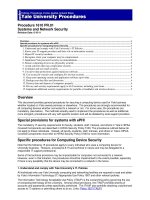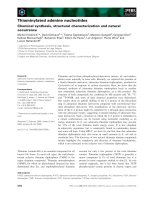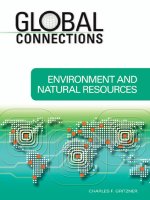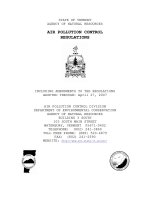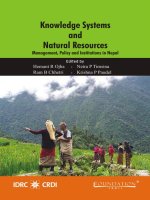Knowledge Systems and Natural Resources potx
Bạn đang xem bản rút gọn của tài liệu. Xem và tải ngay bản đầy đủ của tài liệu tại đây (3.09 MB, 186 trang )
Knowledge Systems
and
Natural Resources
Management, Policy and Institutions in Nepal
Edited by
Hemant R Ojha, Netra P Timsina, Ram B Chhetri
and Krishna P Paudel
International Development Research Centre
Ottawa ● Cairo ● Dakar ● Montevideo ● Nairobi ● New Delhi ● Singapore
Delhi ● Bangalore ● Mumbai ● Kolkata ● Chennai ● Hyderabad
Published by
Cambridge University Press India Pvt. Ltd.
Under the Foundation Books imprint
Cambridge House, 4381/4 Ansari Road, Daryaganj, New Delhi 110002
Cambridge University Press India Pvt. Ltd.
C-22, C-Block, Brigade M.M., K.R. Road, Jayanagar, Bangalore 560 070
Plot No. 80, Service Industries, Shirvane, Sector-1, Nerul, Navi Mumbai 400 706
10, Raja Subodh Mullick Square, 2nd Floor, Kolkata 700 013
21/1 (New No. 49), 1st Floor, Model School Road, Thousand Lights, Chennai 600 006
House No. 3-5-874/6/4, (Near Apollo Hospital), Hyderguda, Hyderabad 500 029
© International Development Research Centre, 2008
Jointly published by Cambridge University Press India Pvt. Ltd. and the International
Development Research Centre.
International Development Research Centre
PO Box 8500
Ottawa, ON KIG 3H9
Canada
www.idrc.ca/
ISBN (e-book) 978-1-55250-371-3
Typeset by Amrit Graphics, Shahdara, Delhi 110 032
ISBN 978-81-7596-563-8
All rights reserved. No reproduction of any part may take place without the written
permission of Cambridge University Press India Pvt. Ltd., subject to statutory exception
and to the provision of relevant collective licensing agreements.
Published by Manas Saikia for Cambridge University Press India Pvt. Ltd. and printed
at Sanat Printers, Kundli.
Contents
Preface vii
Abbreviations x
Glossary of Nepali Words xi
1 Knowledge Systems and Deliberative Interface
in Natural Resource Governance: An Overiew 1
Hemant R Ojha, Ram B Chhetri, Netra P Timsina and
Krishna P Paudel
Introduction 1
Knowledge systems and deliberative interface:
Key theoretical issues 4
Conceptual frameworks for understanding knowledge systems 7
Knowledge systems interface in natural resource governance 12
Overview of case studies 16
References 19
2 Agricultural Technology Development in Nepal: Critical
Assessment from Knowledge System Perspective 23
Netra P Timsina and Hemant R Ojha
Introduction 23
An overview of Nepal Agricultural Research Council 25
Different perspectives on agriculture technology development 26
Scientists’ perspectives 26
Farmers’ perspectives 29
Emerging issues in agriculture technology development:
Whose knowledge counts? 32
Improving deliberative knowledge interface in agricultural
technology development: A way forward 36
References 39
i v
3 Contested Knowledge and Reconciliation in Nepal’s
Community Forestry: A Case of Forest Inventory Policy 40
Krishna P Paudel and Hemant R Ojha
Introduction 40
Introduction of inventory policy in community forestry 42
Inventory in community forest: The problem story 42
The issue of forest inventory in practice 45
Inventory in community forestry: An issue of
knowledge politics 49
The scientific forest inventory and gap in deliberative interface 54
Conclusion 57
References 58
4 From Grassroots to Policy Deliberation: The Case of
Community Forest Users’ Federation in Nepal 60
Hemant R Ojha and Netra P Timsina
Introduction 60
Emergence and expansion of forest users’ federation 63
Evolution 63
What led to the emergence of FECOFUN? 68
FECOFUN’s contribution to deliberative forest governance 70
Raising the level of civic consciousness in forest governance 73
Civic resistance to non-deliberative government decisions 75
Participation in policy deliberation 76
Influencing service delivery system 77
Influencing the agenda and approaches of the
political parties 77
Influencing international developmental discourse 78
Outcomes of FECOFUN actions 79
Civil-technical knowledge interface: Key issues and challenges 80
Conclusion 82
References 83
v
5 From Isolation to Interaction: Increasing Knowledge
Interface in Chhattis Mauja Irrigation system in Nepal 86
Laya Prasad Uprety
Introduction 86
Overview of Chhattis Mauja irrigation system 87
Knowledge systems in Chhattis Mauja: Innovations in technical,
organisational, institutional and governance arrangements 93
Technical arrangements 93
Organisational, institutional and governance aspects 94
Knowledge systems interface: Insights from Chhattis Mauja 102
Conclusion 106
References 108
6 Action Research Experience on Democratising Knowledge
in Community Forestry in Nepal 110
Mani R Banjade, Harisharan Luintel and Hari R Neupane
Introduction 110
Participatory action learning in community forestry 113
Approach and action steps adopted for facilitating
action-learning 115
Step 1: Reflecting upon the situation: understanding
the context 116
Step 2: Analysis and planning 118
Step 3: Putting decisions into action 124
Step 4: Reflection and learning 124
Equity outcomes of the action and learning processes 125
Inclusion of the excluded 125
Creating the bridge between EC and the users:
A mechanism for knowledge interface 126
Making a mechanism for regular monitoring 126
Equity-based forest product distribution system 127
Contested knowledge and deliberative interface 127
Conclusion 130
References 132
v i
7 Culturally Embedded Knowledge in Irrigation:
People’s Ways of Thriving in a Himalayan Village 135
Ram B Chhetri
Introduction 135
Lo Manthang irrigation system: Social and cultural setting 138
Irrigation practices and the role of indigenous knowledge 140
Irrigation and farming practices 142
Water allocation 143
Maintenance and operation 144
The Sakaluka ritual 145
Local myths 146
Interface between local and scientific systems of knowledge 147
Local knowledge: The interplay with power 150
Conclusion 152
References 154
8 Deliberative Knowledge Interface: Lessons and Policy
Implications 155
Hemant R Ojha, Krishna P Paudel, Netra P Timsina and
Ram B Chhetri
Introduction 155
Four systems of knowledge and perspectives 156
Deliberative knowledge interface: Issues and innovations 159
Issues 159
Innovation 164
Findings 166
Conclusion 168
Way Ahead 169
About the Contributors 171
Preface
The book is the outcome of a research project ‘Management of
Knowledge System in Natural Resources: Exploring Policy and
Institutional Framework in Nepal’ undertaken by ForestAction Nepal
with support from the International Development Research Centre
(IDRC), Canada. When we completed the research project with a set
of case studies and a review of theories related to knowledge systems
and governance and shared the findings with a network of readers, we
were excited to get very encouraging feedback. This encouraged us to
compile the work as a book so that the empirical findings and insights
emerging from the analysis could be disseminated to a wider audience.
While preparing the case study reports, we realised that the insights
could be potentially beneficial to the policy makers, researchers, planners
and field practitioners for developing an understanding of the knowledge
systems and their deliberative interface. This idea was materialised with
a generous and continued support from IDRC.
We hope that the compilation of case studies on natural resources,
in the light of critical and theoretical insights, will help one understand
the intricacies of knowledge systems as they relate to governance practices.
There is indeed a continuing need for better understanding of the
contexts, processes and outcomes of the production of knowledge and
its application in various facets of governance of human society. In this
context, our main goal of presenting the case studies in this book has
been to understand how different systems of knowledge operate in the
field of natural resource management, and what factors and conditions
affect the process of deliberation among such knowledge systems. We
have categorised four key systems of knowledge in Nepal based on the
political perspectives and ideologies, which social agents bring in the
discourses and practices of natural resource governance. We hope that
this approach to analysis goes beyond the on-going debates about local
versus scientific, practical versus theoretical and similar categories.
viii
In recent years, we have witnessed that Nepali society is struggling
to come out of the tyranny of feudal monarchy and other modes of
non-deliberative governance situations. Various movements in the recent
past have significantly contributed to pave the path for democracy. Such
movements have made the politicians more accountable, transparent
and deliberative in democratising, decentralising and devolving the rights
to the citizens, including rights to access and control over the natural
resources. In this context, how diverse groups of social agents bring in
knowledge, and engage deliberately to contribute to the processes of
governance is critically important. While our analysis is primarily related
to natural resource governance, we believe that the emerging discourse
and deliberation of restructuring the Nepali state can also benefit from
the findings presented in the book.
As editors, we feel that the case studies can forward fresh perspectives
for integrating knowledge and governance in natural resource sectors.
First, the four key categories of social agents corresponding to their
relatively distinct systems of knowledge are identifiable – techno-
bureaucrats, civil society groups, politicians and development agencies.
Our main message in this connection is that governance can be understood
in terms of the nature and extent of deliberative interface among the
knowledge systems of these groups of social agents. While there can be
a whole range of differentiated groups within these categories, they are
associated with different systems of knowledge and hence bring different
perspectives and ideas in the collective action situations of governance.
Second, the case studies suggest a number of innovations in the deliberative
interface, such as emergence of federation of civil society groups,
participatory mechanisms through which technical specialists and natural
resource users work together in undertaking research and devising policies,
emergence of critical and reflective intellectual practitioners and civil
society activists working to bridge technical and civil society knowledge.
Third, the constraining impact on deliberative knowledge interface among
other systems, primarily as a result of unequal distribution of knowledge
resources in the society, has also been identified.
i x
Editing this book has been a process of deliberation among editors
and writers who, have different perspectives on how knowledge systems
work in the practice of governance. As editors, we have sought to develop
theoretically nuanced understanding of how knowledge systems work
and how they can improve practices of governance. Our attempt has
been on critically reviewing the ideas and concepts applied by the social
agents engaged in one or the other systems of knowledge. Through
writing workshops and manuscript reviews, we have sought to orient
the authors to present case studies in a coherent framework. The authors
were also given ample freedom to present their findings in the ways
they think appropriate.
The case studies and analytical discussions presented in this book
are the outcomes of interactions, discussions and reflections with many
people in the research sites, with whom we worked, shared and gained
valuable information during the study period. We would like to
acknowledge the valuable knowledge contribution of all the people
involved. We would like to express sincere gratitude to people of the
research sites for their willingness to participate in the discussions and
to generate important information and insights. In particular, we
appreciate the contribution of local community user groups on forest
and irrigation, Federation of Community Forestry User Groups, National
Agricultural Research Council, ForestAction Nepal, and Environmental
Resources Institute.
Editors
March 2007
Kathmandu
Abbreviations
APP Agriculture Perspective Plan
APROSC Agricultural Projects Service Centre
CBO Community Based Organisation
CBS Central Bureau of Statistics
CF Community Forest/Forestry
CFM Collaborative Forest Management
CFUG Community Forest User Groups
CMIS Chattis Mauja Indigenous Irrigation System
CIMMYT International Maize and Wheat Improvement Centre
DAO District Administration Office
DFID Department for International Development
DFO District Forest Offices
DoF Department of Forest
FECOFUN Federation of Community Forestry Users Nepal
FMIS Farmer-Managed Irrigation System
FSCC Forestry Sector Coordination Committee
GON Government of Nepal
LFP Livelihood and Forestry Programme of DFID
MFSC Ministry of Forest and Soil Conservation
NARC Nepal Agricultural Research Council
NARI National Agricultural Research Institute
NASRI National Animal Science Research Institute
NGO Non Governmental Organisation
NNN Nepal NTFP Network
NTFP Non Timber Forest Product
OFMP Operational Forest Management Plan
OP Operational Plan
ORD Outreach Research Division
PAL Participatory Action and Learning
PVS Participatory Varietals Selection
SDC Swiss Development Cooperation
TCN Timber Corporation of Nepal
VDC Village Development Committees
WATCH Women Acting Together for Change
WUA Water Users Association
Glossary of Nepali Words
Badghar A person who is the traditional headman of Tharu
community in Nepal.
Bigha A unit of land measurement (equivalent to 0.6772
hectares).
Bighatti The amount of irrigation fee collected per bigha of
land in the Mauja which varies from Mauja to
Mauja. Water users who do not contribute labour
to repair and maintain the main canal are required
to pay the irrigation fee.
Chauble Four labourers to be sent per 25 bighas of land for
the repair and maintenance.
Chaukidar Watchman-cum-messenger in the local context.
Chhattis Mauja A landscape comprising of 36 villages (which were
the original command areas).
Gaun Village
Jamindar A Jamindar in pre-1961 period in the plains of
Nepal was a local landlord who was responsible for
the reclamation of the land for the settlements and
collection of revenue.
Kattha One-twentieth of a bigha (0.0339 hectares).
Khara It is the fine imposed for being absent to contribute
the labour for the repair and maintenance.
Kulahai The labour work for the repair and maintenance of
the canal.
Kulara One Kulara means one labourer per 25 bighas of
land which is the unit of water allocation between
and among the Maujas of the irrigation systems.
Mauja A cluster of settlement which roughly corresponds
to a village.
xii
Meth Muktiyar The system level chief staff.
Mohda The water diversion location from the main canal.
Muktiyar The chief of a Mauja.
Nath The measurement of the main canal assigned by
the Meth Muktiyar to each Mauja for the annual
repair and maintenance which is proportionate to
the size of its command area.
Panchayat It was a non-party political system until 1990.
Sabik It means as usual i.e. one labourer per 25 bighas for
repair and maintenance.
Sidhabandhi It was a repair and maintenance culture of the Tharus
with necessary foodstuffs because they had to spend
several nights at the improvised camps until the
work was over. It was evolved as a function of the
long distance of the headwork and the upper part
of the canal from the original settlements.
Sohra Sixteen
Terai A plain area in the southern part of Nepal.
Treble Three labourers to be sent per 25 bighas of land for
repair and maintenance.
Panchayat The village council until 1990.
1
Knowledge Systems and Deliberative
Interface in Natural Resource Governance:
An Overiew
Hemant R Ojha, Ram B Chhetri,
Netra P Timsina and Krishna P Paudel
Introduction
This book analyses how diverse knowledge systems operate in the field
of natural resource management in Nepal. In order to examine the
status of knowledge systems interface and identify the challenges of
participatory and deliberative governance of natural resources, the book
presents six case studies on forest, agriculture and water governance at
different levels – from local community (such as a farmer managed
irrigation system) to national research system (such as national
agricultural research council) and civil society networking (such as
national federation of community forestry users). The over arching issue
being addressed in the book is – how questions of equity, efficiency
and sustainability in natural resource management are shaped, influenced
and determined by deliberative interfaces among diverse knowledge
systems associated with diverse groups of social agents engaged in the
practice of natural resource governance. Analysis of this issue in the
2 Knowledge Systems and Natural Resources
light of empirical evidence and theoretical perspectives can help us draw
policy and practical implications for effective knowledge management
and social learning in natural resource governance. The book is primarily
an analysis of Nepal’s experiences and the findings have much wider
relevance.
The rationale of the book rests on the need to explore innovative
processes and policies to facilitate inclusive, deliberative and equitable
governance of resources. Despite recent upsurge of participatory
innovations in development actions (Chambers 1994; Chambers 1997)
and natural resource management, there is a continuing concern over
limited real achievement in terms of local livelihood, economic
contributions and natural resource sustainability (Cook and Kothari
2001; Edmunds and Wollenberg 2002; Colfer and Capistrano 2005).
In many situations, collective processes of institutions and policy fail to
address the opportunities to optimise individual and collective benefits
from natural resource governance practices. One of the consequences of
such failure is that a vast majority of the world’s poor who continue to
live at the interface between land, forest and water, often have limited
access to such vital resources (Scherr et al. 2004; Sunderlin et al. 2005).
This reality is in part related to how and to what extent diverse groups
of social agents, often with different and competing systems of
knowledge, deliberate over decisions and practices of natural resource
governance. In other words, the challenge of achieving equitable
governance of natural resources is related to the ways through which
diverse knowledge systems come into deliberative interface to transform
or reproduce relations of power and rules of practices.
The challenge of achieving equitable impact from natural resource
management is even more critical in view of the expanding frontiers of
knowledge and consequent inequity in distribution of knowledge
resources at local, national and global levels (Arunachalam 2002; Dufour
2003). As knowledge is expanding exponentially in the global arena,
many states with poorly developed knowledge capacity are lagging behind
the others in their ability to devise effective policy solutions to a wide
range of development problems. The expanding knowledge gaps at all
levels have been a concern worldwide, as these gaps are increasingly
recognised as being associated with the deteriorating global peace,
inequity, environmental degradation and enduring poverty (Arunachalam
2003; Dufour 2003). There is, thus, a direct linkage between equity in
sharing benefits from natural resource management and equity in the
distribution of knowledge resources.
Involvement of an increasing array of stakeholders in natural resource
management has created conditions for conflict and the processes of
negotiations will inevitably lead to governance solutions. The emerging
diversity of stakeholders has also given rise to the potential for pooling
of diverse knowledge traditions in the practice of natural resource
governance. But the actual deliberative interface has often been negatively
affected by conflicts among different knowledge systems that have
developed historically. In Nepal we see that natural resource management
practices are mediated by at least four different but overlapping systems
of knowledge, viz, techno-bureaucratic knowledge systems, knowledge
systems of development agencies, knowledge systems of politicians, and
knowledge systems of civil society networks. In the processes of political
interaction and deliberation over issues of natural resource governance,
we see that these four systems of knowledge underpin the constitution
of the four categories of social and political agents. The case studies
follow and analyse interaction among these knowledge systems and the
ways in which practices of natural resource governance are mediated.
While Nepal’s natural resource policies such as community forestry
and farmer managed irrigation system have come a long way towards
recognising local rights and responsibilities, there are still concerns over
achievements of desired outcomes in terms of equity and justice for
people. In many parts of the developing world, policies and programmes
on participatory natural resource management are just evolving, and
there is a significant potential of analysis of knowledge systems driving
such practices towards understanding how better results can be achieved.
In this context, lessons from the analysis of case studies on natural
Knowledge Systems and Deliberative Interface in Natural Resource Governance 3
4 Knowledge Systems and Natural Resources
resource management in Nepal with varied levels of innovations
generate useful insights into how deliberative interface of diverse
knowledge systems can be strengthened to achieve effective and equitable
impact.
The book does not seek to provide a comprehensive assessment of
participatory or community based natural resource management
practices. It focuses on documenting and interpreting how different
groups of social agents engage in various systems of knowledge, and
how the processes of deliberation takes place across different groups
that draw on diverse systems of knowledge. The next section of this
chapter provides a theoretical overview of the issues and concepts related
to knowledge, power and governance. Here, we outline how human
agency engages and contests in the process of learning and governance.
We then present key analytical issues in relation to natural resource
management. In the final section of this chapter, we present a
comparative overview of the case studies presented in the book.
Knowledge systems and deliberative interface:
Key theoretical issues
In this section, we explore the potential of learning and deliberation in
the works of key contemporary thinkers such as Habermas, Giddens,
Bourdieu, Foucault and Dewey (Key points enumerated on p. 5). The
potential of human agency to learn and innovate has significantly
expanded since the European Enlightenment in the sixteenth and
seventeenth centuries. Since then, science has emerged as a dominant
way of understanding social and physical world. The triumph of science
which was triggered by experimental methods usually employed in
physical world has led to ‘overscientisation’ of social and political life.
Habermas differentiates two domains of learning – technical knowledge
and communicative knowledge (Habermas 1971, 1987). While the first
is related to how we understand nature to augment human purpose,
the second is related to how as humans we understand other each better
to create and transform social relationships for greater justice. In
Habermasian language, the second aspect of knowledge is regarded as
communicative reason (or communicative rationality) which can
potentially be the basis for humans to deliberate across diverse systems
of knowledge in order to develop organisations for collective coexistence.
Key theoretical dimensions of learning, power and governance
a. Learning is related to ‘agency’ dimension of social system
(Giddens). Human agency has both discursive as well as doxic
elements and learning should be a reflective process to transform
doxa (Bourdieu).
b. Human knowledge oriented to understanding nature should be
differentiated from human knowledge oriented towards
understanding relations between human agents (Habermas).
c. Learning involves both individual as well as collective processes,
and collective processes of learning are more crucial to
understanding governance and change (Habermas, Dewey).
d. Social agents or ‘agencies’ are not equipped with equal
opportunities to engage in a learning process, and as such learning
opportunity itself can be an important cause and effect of social
differentiation (Bourdieu).
e. In the contemporary debate between modernity and post-
modernity (Habermas versus Foucault and Lyotard), a drive to
explore the possibility of human knowledge in desirable social
change lies not in either of the extremes but in a critical
reconstruction of communicative reason as a basis of social
learning (Habermas).
In the post World War II period, western societies sought to assist
non-western societies in the process of modernisation and development
(Sachs 1993). While such efforts have contributed to physical progress
of human beings, they have tended to promote technical knowledge
(Scott 1998), at the cost of communicative reason. As a result, socio-
political issues are either increasingly being handled by technical experts
of government or left to the logic of market, thus minimising the
Knowledge Systems and Deliberative Interface in Natural Resource Governance 5
6 Knowledge Systems and Natural Resources
space for deliberation among groups of diverse systems of knowledge.
Habermas’ reconstruction of rationality has sought to locate the
communicative domain of learning away from the technical domain.
This has indeed inspired deliberative approaches to governance across a
wide variety of collective action situations (Bohman and Rehg 1997;
Dryzek 2000). Likewise, another prominent philosopher belonging to
the pragmatic school of thought John Dewey’s idea that society exists
through ‘transactional’ process of communication and that democracy
is itself a learning process (Dewey 1916/1966, 1933/1986; Dewey and
Bentley 1949) very much resonates Habermas’s conception of
communicative democracy. The Pragmatists emphasis on knowledge as
practical enterprise parallels Bourdieu’s emphasis on practical rationality
of human action.
When it comes to communicative interaction or deliberation, the
role of human agency is crucial. Giddens has ascribed qualities such as
knowledgeability and capabilities on human agency through which they
can learn and reconstruct social systems (Giddens 1984). Bourdieu,
however, cautions on the excessive optimism of the free will in agency
as he considers that human agents are located in structured spaces with
pre-reflective dispositions which he calls ‘doxa’, which inscribes conscious
and discursive agency (Bourdieu 1984, 1990, 1998). His view is that
discursive knowledge is just a thin tip of a thick doxa (Crossley 2003;
Hayward 2004), implying a need for deepening discursive domain of
human agents through increased self-reflexivity. In addition, Bourdieu
holds that the inherent diversity and differentiation among social agents
mean that dominant groups are structurally in better positions to create
more holistic and legitimate claims to knowledge through more effective
allocation of efforts for action and reflection.
Viewing from the post-structuralist perspective, Michel Foucault
(Foucault 1972) considers discourse as the breeding ground for the
emergence of social agents. This view widens the scope of deliberative
interface, beyond individual reflexivity of social agents who are themselves
the products of one or the other discursive formation. For Foucault,
discourse creates political subjects along the three axes of human existence
– knowledge, power and ethics. He treats knowledge as embedded in
existing power structures. Lyotard, who is even more of a radical
postmodernist, has challenged science as an enterprise of experts rather
than an objective procedure of representing truth (Lyotard 1993), invoking
a relativist epistemology wherein no one can represent no one else. While
such poststructural sensibility helps us to think beyond accepted ways of
knowing, we cannot ignore the useful roles played by authors and experts
when they work in close deliberation with the social agents. For us, the
critical question is not whether or not epistemological representation is
possible but how holders of different systems of knowledge can arrive
at fair practices through negotiation.
Bourdieu’s perspective on knowledge should be understood in the
universe of practice theory. He has sought to explain social practices in
terms of culturally inscribed human agency (habitus), differentiated social
domains in which social agents interact (field) and various types of
goals which the agents pursue (economic, social, cultural, economic
and symbolic capitals). He argues that any social practice results from
the interaction among habitus, rules and rewards available in the particular
fields, and the structure of access to different types of capitals – social,
economic, cultural and symbolic.
Conceptual frameworks for understanding knowledge
systems
There are diverse approaches to understanding knowledge systems in
diverse contexts of governance. Each of these approaches emerge from
particular disciplinary and cultural contexts, and have different degrees
of relevance to the field of natural resource management. These are
briefly outlined below.
● Organisational learning: R M Cyert and J G March (Cyert and
March 1963) is considered the foundational work in organisational
learning (Easterby-Smith and Lyles 2003; Easterby-Smith 2003).
V E Cangelosi and W R Dill (Cangelosi and Dill 1965) revealed
the tensions between individuals and organisation, critiquing the
Knowledge Systems and Deliberative Interface in Natural Resource Governance 7
8 Knowledge Systems and Natural Resources
work of Cyert and March as being suggestive of models appropriate
for established organisations in stable circumstances (Easterby-Smith
and Lyles 2003). Special edition of Organisation Science in 1991
significantly popularised the field of organisational learning.
J S Brown and P Duguid (Brown and Duguid 1991) laid the
foundation for social processes of organisational learning, moving
away from personal and psychological emphasis, followed by
J Lave (Lave 1988) and others. C Argyris and D Schon (Argyris
and Schon 1978) laid the field more clearly, making the critique
of rationalist assumptions of Cyert and March, and introducing
new concepts (such as ‘defensive routines’ as the barrier to learning)
(Easterby-Smith and Lyles 2003).
● Learning organisation: The learning organisation tradition was
popularised by P M Senge (Senge 1990), as a practitioner-oriented
field of knowledge, emphasising instrumental view (as an aid to
technical efficiency) of learning, but playing down social-emotional
aspects and political consequences of learning (Garrat 2000).
● Knowledge management: Knowledge management (Malhotra and
Galletta 2003) seems to take an even more instrumental view of
learning, emphasising managed learning using technical tools.
● Adaptive management: K N Lee (Lee 1993, 1999) stipulates the
idea of adaptive management that considers policies as experiments,
and hence emphasises the need for combining monitoring and
learning in actual management and collective action situation.
Knowledge systems are thus integral to practical and experimental
actions, which are designed to solve the immediate human purpose
as well.
● Social learning: K N Lee (Lee 1993) considers social learning as a
combined form of adaptive management and politics – a process of
negotiation among diverse groups of social agents. The emphasis
here is on exploring how societal institutions can learn, including
who learns why and to what extent, under what conditions
(Maarleveld and Dabgbégnon 1999; Wollenberg et al. 2001; Röling
2002).
● Adaptive collaborative management (ACM): ACM blends ideas
of learning and social interactions from a diverse range of
theoretical sources (Colfer 2005). It builds on Lee’s (1993) idea
of combining science and politics for social learning in
environmental management. It draws on the understanding of the
dynamic and complex nature of socio-ecological systems of
Gunderson and Holing (Gunderson and Holing 2002). It also
draws on the fields of organisational learning and learning
organisation to recognise the importance of constant learning in
the human interface and creating shared visions of change (Senge
1990, Argyris and Schön 1996). It emphasises making explicit
background suppositions of plans and activities, and incorporating
a monitoring process tied to the action so that learning does not
just become incremental but, seeks to reconstruct perspectives and
conceptual frames (Taylor 1998).
● Action and knowledge/ Participatory Action Research (PAR):
O Fals-Borda and M A Rahman’s (Fals-Borda and Rahman 1991)
conceptualisation of action and knowledge also seeks to bring
learning outside of instrumental domain and engage agencies
critically and politically. Here the emphasis is on exploring the
emancipatory potential of action and learning, often with critical
facilitative support from the agents of change.
● Participatory learning and action: Contributions of Paulo Frairie
and Robert Chambers (Chambers 1994) have sought to link
learning systems of outsiders and insiders in the context of rural
development. While Frairie concentrated on developing critical
consciousness and conscientisation, Chambers developed
methodologies and tools such as participatory rural appraisals to
assist outsiders to learn from the local subjects of development.
● Transformative learning: Transformative approaches to learning
seek to reconstruct perspectives and conceptual frames (Taylor
1998) of human agents as well as develop better understanding of
each other through open and deliberative interactions (Forester
Knowledge Systems and Deliberative Interface in Natural Resource Governance 9
10 Knowledge Systems and Natural Resources
1999). These approaches emphasise changes in basic structures of
cognition in contrast with incremental approaches to learning.
● Deliberative processes/deliberative science: The notion of
deliberation is invoked to bring the process and scope of inquiry
and learning beyond the domain of expert. Deliberation is
considered an opportunity for people to respect each other as
moral agents and reach reasonable and legitimate solutions to
disputes beyond the confinement of expert inquiry (Forester
1999; Fischer 2003). Since the issues of governance are essentially
normative and are not always amenable to objectivist analysis
of empirical data, scientific inquiry has sought to ‘settle rather
than stimulate’ the policy debates (Fischer 1998). Deliberative
scientific approaches therefore, emphasise on dialogues and
negotiation among all pertinent systems of knowledge around
the issue of governance.
While a range of approaches to understand and promote knowledge
systems are developing in diverse contexts, there is still a paucity of
conscious application of such approaches in the field of natural resource
governance. Historically, governance of natural resources has been
sustained by one or the other forms of knowledge, which actually
represent the power and interests of those actors who have been able to
influence the practice of natural resource governance. The agrarian society
developed what is known now as traditional and indigenous systems of
knowledge around diverse types of natural resources, and these systems
of knowledge are often contrasted with modern or scientific knowledge,
which was promoted by state bureaucracies and modern development
projects. While there are studies on how local and scientific knowledge
can work together, a key debate in natural resource management is still
related to combining indigenous and scientific knowledge systems (Fisher
1989; Chhetri and Pandey 1992; Sillitoe 1998). While many recognise
the value of both systems of knowledge in development, debates persist
as regards how they can be integrated, and how agents can engage in
open deliberation on equal footing to choose and combine local and
scientific knowledge systems
1
(Chhetri 1999). Tensions between these
tendencies are often manifested in day-to-day practices. We, therefore,
take this issue of how local or civil society based knowledge and scientific
knowledge can or cannot be integrated in the case studies.
In addition, there are limited analyses of how the interfaces between
these two knowledge systems get compounded when the perspectives
of political agents and development agencies also come to interact with
the former. The other gap is that there are limited analyses on how
traditional knowledge resources are also differentially accessible to and
controlled by different groups of local people who are themselves divided
along multiple axes of hierarchy, such as caste and gender. We argue
that natural resource governance cannot be dealt through the
dichotomous division between scientific and indigenous knowledge
systems; rather we need to explore diverse systems of knowledge triggered
by specific configuration of political interests and cultural formations.
In the next section, we present diverse systems of knowledge as found
in the context of natural resource management in Nepal.
In every human institution, knowledge and power are inextricably
linked factors
2
, and the treatment of knowledge in isolation gives an
incomplete view of learning and innovation system. Power is grounded
in diverse dimensions of social class – such as caste, economic assets,
1
Rist and Dahdouh-Guebas (2006) identify a range of scenarios through which science
and local knowledge can come into interface: Unacknowledging (science simply ignores
a practice based on local knowledge), utilitarian (elements of local knowledge that can
be scientifically understood or validated are accepted to increase the stock of scientific
knowledge), paternalistic (traditional knowledge is conceived of as a starting point that
requires ‘updating’ by science), neo-colonial (traditional knowledge and local data are
taken from local people and research institutions), essentialist (local knowledge is
fundamentally better than science, it should not be influenced by Western technology
and should have the right to remain as it is), and intercultural science (science is aware
that it is only one type of knowledge among others, and that knowledge is always
embedded in cultural and historical settings. Science and local knowledge can benefit
from comprehensive interaction).
2 This is the reciprocal nature of these two words that Foucault titled ‘power/knowledge’
Allen, B. (1999). ‘Power/Knowledge’ Critical Essays on Michel Foucault. E. K. Racevskis.
New York: G.K. Hall & Co.
Knowledge Systems and Deliberative Interface in Natural Resource Governance 11
12 Knowledge Systems and Natural Resources
symbolic capitals (such as social status), gender and ethnicity, to varying
degrees. Knowledge-power nexus is enacted, contested and resisted in
day-to-day governance practices. Several of the reported tensions in
deliberative interface – such as scientific versus indigenous knowledge,
theoretical versus practical knowledge – are actually the result of
underlying power relations among the social agents.
Knowledge systems interface in natural resource
governance
Practices of natural resource governance are shaped by knowledge systems
of, and deliberative interfaces among, diverse groups of social agents
that tend to vary both in terms of knowledge and other aspects of
differentiation. In terms of knowledge-based differentiation, we agree
with H R Ojha (Ojha 2006) that four broad categories of social agents
claim one or the other forms of stakes in natural resource governance,
informed by different systems of knowledge. These are formal political
agents, civil society groups, techno-bureaucrats, and development
agencies/ professionals (see Fig. 1.1). Depending on the specific contexts
of natural resource governance practice, these social agents nurture and
utilise different systems of knowledge to learn internally and deliberate
with each other.
Besides knowledge based differentiation, other forms of
differentiation within and between these categories are also critical to
understand the possibility of deliberation in governance. In the unequal
and hierarchical social systems of Nepal, knowledge as cultural capital is
not equally accessible to all social groupings, and quite often the cultural
capital has been a key element of domination in social, political and
economic arena. Since constructing knowledge requires engagement in
action, reflection, networking and sharing (Dewey and Bentley 1949),
agencies that have access to time and resources to such processes are in a
better position to learn. This applies to the condition of social inequality
from a small community to global system.
